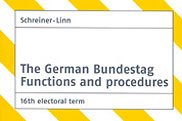Navigationpath: Homepage > German Bundestag > Council of Elders > Functions and duties
Functions and duties of the Council of Elders

One of the folders used by the Council of Elders © German Bundestag
Members of the Presidium and the parliamentary groups
In the 16th electoral term, the Council of Elders of the German Bundestag has a total of 30 members. It is made up of the President of the German Bundestag, his six Vice-Presidents and 23 Members who are appointed by the parliamentary groups. Here too, seats are distributed according to the relative strengths of the parliamentary groups in the Bundestag.
The members of the Council of Elders also include the parliamentary secretaries of the parliamentary groups, who meet separately for detailed preliminary talks on the procedural aspects of the deliberations that are to take place. The agreements reached at these meetings of the parliamentary secretaries are then taken into account in the discussions of the Council of Elders.
The Council of Elders meets regularly each week when the Bundestag is sitting and is chaired by the President of the German Bundestag. A representative of the German Federal Government also attends its meetings.
Assisting the President of the German Bundestag
The Council of Elders assists the President of the German Bundestag in the conduct of parliamentary business and ensures that agreement is reached between the parliamentary groups.
It takes up its various duties at the beginning of the electoral term when the parliamentary groups agree in the Council of Elders on who are to be the chairpersons and deputy chairpersons of the committees.
The Council of Elders schedules the dates of the sitting weeks for the coming year well in advance. The agendas for plenary sittings are set shortly before they take place – always being decided during the previous sitting week.
In performing these duties, the Council of Elders acts on an advisory basis and not as a decision-making organ. In consequence, it merely delivers recommendations and proposals that the plenary is entitled to accept or reject.
Ensuring agreement between the parliamentary groups
One important duty of the Council of Elders is to ensure agreement is reached between the parliamentary groups.
For instance, numerous questions that relate to the scheduling of committee activities, the referral of draft bills to the committees and the rights of the Members of the German Bundestag are discussed by the President of the German Bundestag with the Council of Elders.
Every effort is made to put in place arrangements that all the parliamentary groups are able to accept. Furthermore, disputes that arise during plenary sittings can often be settled at meetings of the Council of Elders.
Decisions on the business of the German Bundestag
Another of the duties of the Council of Elders is to take decisions on the internal business of parliament, except when they fall within the exclusive competence of the President or the Presidium.
For instance, the Council of Elders prepares the "estimates for the Bundestag budget". The Budget Committee can only deviate from these estimates in consultation with the Council of Elders, which means it has to give the Council of Elders an opportunity to comment on the figures before the final decision is taken.
The Council of Elders also decides on the allocation of rooms to the parliamentary groups and the Administration of the German Bundestag, as well as questions relating to Members’ staff.
Decisions of this kind are prepared by the commissions the Council of Elders establishes to support it in its work.
Further Information
Information Material
- The German Bundestag - functions and
procedures


